The Conversational Marketing Software Market is estimated to be valued at USD 0.8 billion in 2025 and is projected to reach USD 3.6 billion by 2035, registering a compound annual growth rate (CAGR) of 16.8% over the forecast period.
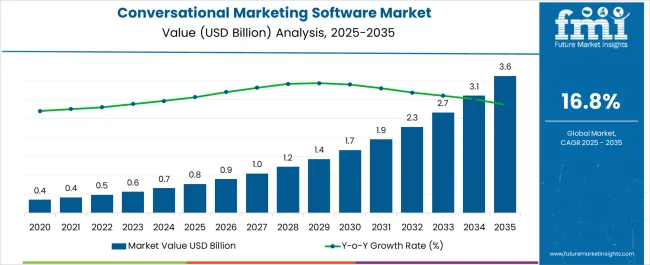
| Metric | Value |
|---|---|
| Conversational Marketing Software Market Estimated Value in (2025 E) | USD 0.8 billion |
| Conversational Marketing Software Market Forecast Value in (2035 F) | USD 3.6 billion |
| Forecast CAGR (2025 to 2035) | 16.8% |
The conversational marketing software market is progressing steadily, supported by the rising need for real-time customer engagement and the digital transformation of sales and marketing strategies. Industry journals and corporate announcements have emphasized the growing adoption of AI-powered chatbots, voice assistants, and live engagement tools that allow businesses to personalize customer interactions and accelerate lead conversion.
Large organizations across industries are investing in conversational platforms to unify customer touchpoints, streamline buyer journeys, and enhance customer experience while reducing operational costs. Strategic partnerships between software providers and cloud vendors have also expanded solution accessibility and integration with CRM systems.
Furthermore, data privacy regulations and compliance frameworks have influenced enterprises to deploy robust security features in conversational tools. Looking forward, the market is expected to benefit from the convergence of natural language processing, predictive analytics, and automation, enabling companies to deliver more intuitive and effective customer engagement strategies.
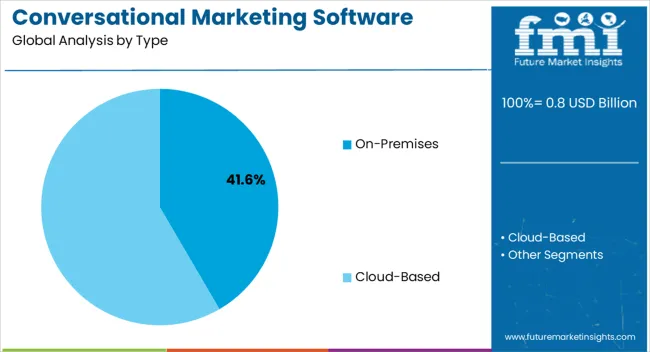
The On-Premises segment is projected to contribute 41.6% of the conversational marketing software market revenue in 2025, maintaining its significance despite the rise of cloud-based models. This share has been sustained by enterprises that prioritize direct control over data security, compliance, and system customization.
Organizations operating in regulated sectors such as finance and healthcare have favored on-premises deployment to ensure adherence to strict data governance policies. In addition, large corporations with extensive IT infrastructure have continued to rely on on-premises systems due to their ability to integrate deeply with legacy applications and internal databases.
While cloud adoption is accelerating, the resilience, configurability, and perceived security advantages of on-premises solutions have preserved their demand among enterprises seeking long-term stability and regulatory compliance. This dynamic has enabled the On-Premises segment to hold a strong position within the market.
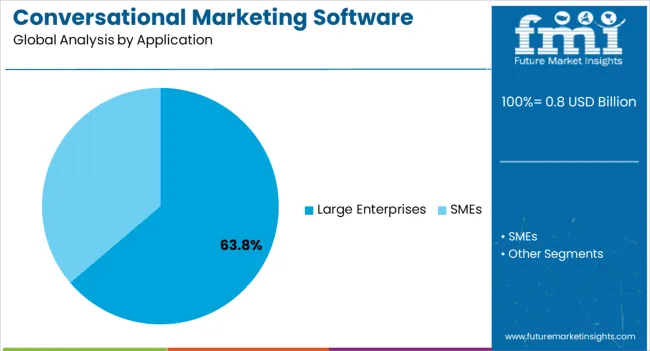
The Large Enterprises segment is projected to account for 63.8% of the conversational marketing software market revenue in 2025, establishing itself as the dominant application segment. Growth in this segment has been driven by the complexity of customer engagement needs and the scale of operations that require advanced conversational tools.
Large enterprises have invested heavily in AI-powered platforms to manage high customer volumes, improve personalization, and optimize cross-channel communication. Investor presentations and press releases from leading vendors have indicated strong demand from global corporations aiming to enhance sales funnels and improve customer retention metrics.
Furthermore, large organizations have allocated greater budgets to integrate conversational software with CRM, ERP, and analytics platforms, maximizing business value through data-driven insights. The emphasis on omnichannel engagement strategies has also reinforced the adoption of conversational marketing software within large enterprises. As companies continue to compete on customer experience as a differentiator, this segment is expected to remain the key driver of market growth.
Future Market Insights reveals that conversational marketing software revenues increased from USD 0.4 million in 2020 to USD 0.8 million in 2025. With an absolute dollar opportunity of USD 0.8 million between 2025 and 2035, the market is projected to reach a valuation of USD 3.6 billion by 2035.
More than 80% of B2B sales involve complicated buying scenarios, and 60% of purchases involve four or more parties. Knowledgeable customers demand efficiency, simplicity, and top-notch service at every stage of the customer lifecycle, from initial contact to product installation. The transition to a digital-first economy and rising competition across all industries make it more challenging than ever to sell, market, and provide efficient customer service. Therefore, with the advent of conversational marketing software, the online buying process has been changed indefinitely. Conversational marketing software provides users with a customizable experience and generates customer satisfaction, and growth in the customer base, thereby increasing the revenue of the businesses.
The continuous innovation in sales and marketing platforms is driving the need for conversational marketing software to keep up with the competitors. Furthermore, the need to constantly be with the customer while they make purchase decisions is another key factor driving the requirement for conversational marketing tools.
A business recognizes that building a strong relationship with the consumer is crucial to selling or growing a product, and it has been proven as a successful way to use marketing to drive user engagement. Therefore, various consumer brands are leveraging conversational marketing technology to identify known or unknown buyers from different social networks or product websites.
In addition, conversational marketing strategies have developed a customer-centered purchasing process by utilizing intelligent chatbots and customized messaging to interact with leads in real-time. The automated conversation marketing strategy helps companies convert leads more quickly, which makes it simpler for customers to contact the firm through their preferred channel.
Conversational AI has transformed the way brands connect, interact and engage with customers. AI through machine learning, natural language processing, automatic speech recognition, and text-to-speech elements, interacts with customers through chatbots and voice bots and enhances their experience. Another key advantage of AI is that it offers consistent experience across all channels. It solves the problem of waiting for hours to connect with an executive to resolve the query and plugs the gap by offering fast response. Conversational AI will progress toward utilizing voice-based support as chatbot technology develops. Since customer satisfaction encourages recurring business as well as optimising an organization's revenue, conversational AI has been shown to be a cost-effective technology.
In light of this, conversational marketing software has a substantial market potential and is anticipated to grow rapidly during the forecast period. According to the survey conducted by Drift and Heinz Marketing, it was observed that 82% of the respondents found that AI-powered conversational marketing helped the sales and marketing strategy.
Asia-Pacific provides a lucrative growth option for the development of conversational marketing software. Around 42% of businesses surveyed in Asia-Pacific declared that they have implemented chatbots as a form of customer service automation or are in the process of implanting them in the near future. A huge portion of customer relations is still managed by staff while there is still significant space for the growth of conversational marketing software in the APAC market.
To successfully adopt automation in their businesses, they need to incorporate a human layer into the conversational chatbots to facilitate a friendly interaction with the users and make them comfortable talking to an AI bot. To move forward, companies involved in providing conversational marketing tools have already secured their footprint in Asia-Pacific. For instance, Verloop.io and tech Access Asia entered into strategic partnership to gain access to Verloop.io’s conversational AI platform across the Middle East, LEVANT, and Pakistan and build delightful support experiences without any hassle.
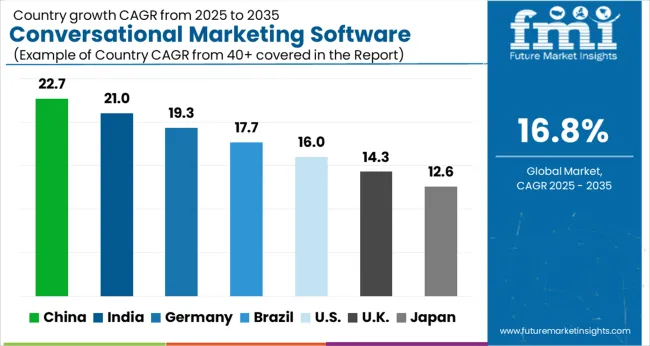
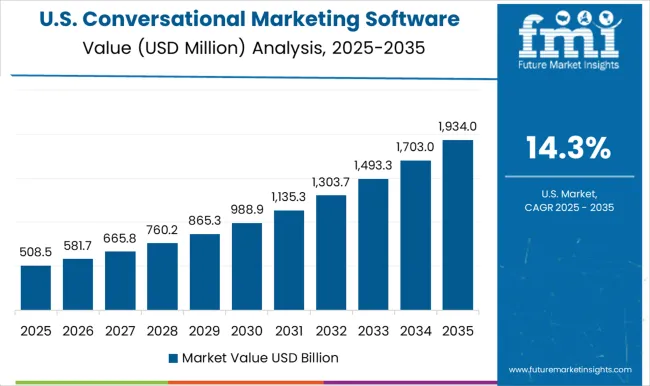
Conversational marketing software in the United States is projected to be valued at USD 3.6 million by 2035. Revenue through conversational marketing software flourished at a CAGR of 31.4% during 2020 to 2025. Growth in the market is attributed to a rise in the number of enterprises and the presence of a large number of vendors providing conversational marketing solutions. For instance, iAdvize expanded its presence in the United States in the sales and marketing domains to secure its footprint in the United States. The expected growth rate in conversational marketing software in the United States is estimated at 17.2% CAGR over the forecasted period. It is projected that the United States will become a market with an absolute dollar opportunity growth of USD 671.4 million by 2035.
Revenue through cloud-based conversational software grew at a CAGR of 31.6% during 2020 to 2025. The anticipated growth rate in cloud-based conversational marketing software is estimated at 17.1% CAGR over the forecasted period. Cloud platforms are cost-effective as enterprises don’t require to set up and own computing infrastructure. It allows the software to co-exist remotely and therefore key companies involved in the conversational marketing software market have transitioned to cloud-based platforms.
In terms of application, conversational marketing software witnessed immense growth in large enterprises. Revenue through large enterprises grew at 31.2% CAGR during 2020 to 2025. Various automated customer support channels are investing in large enterprises to expand their reach in the conversational marketing software market.
For instance, Verloop, a customer support automation platform collaborated with more than 5,000 brands globally including Decathlon, Adani Capital, and DSP mutual funds. With rapidly changing consumer behavior, large brands are focussed on enriching their customer support experience by adopting conversational marketing tools. The anticipated growth rate of the conversational marketing software revenue through large enterprises during the forecast period is estimated at 16.6% CAGR.
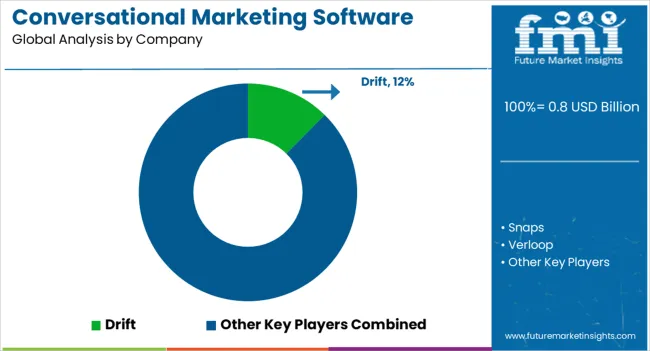
on collaborating with social media networks to deploy advanced customer support experience. The key companies operating in the conversational marketing software market include Drift, Snaps, Verloop, iAdvize, LiveWorld, Automat, Intercom, HubSpot, Conversica, Saleswhale, Whisbi, Slaask, Audiense, Spectrm, and Zoovu.
Some of the recent developments by key providers of conversational marketing software market are as follows:
Similarly, recent developments related to companies involved in conversational marketing software have been tracked by the team at Future Market Insights, which is available in the full report.
The global conversational marketing software market is estimated to be valued at USD 0.8 billion in 2025.
The market size for the conversational marketing software market is projected to reach USD 3.7 billion by 2035.
The conversational marketing software market is expected to grow at a 16.9% CAGR between 2025 and 2035.
The key product types in conversational marketing software market are on-premises and cloud-based.
In terms of application, large enterprises segment to command 63.8% share in the conversational marketing software market in 2025.






Our Research Products

The "Full Research Suite" delivers actionable market intel, deep dives on markets or technologies, so clients act faster, cut risk, and unlock growth.

The Leaderboard benchmarks and ranks top vendors, classifying them as Established Leaders, Leading Challengers, or Disruptors & Challengers.

Locates where complements amplify value and substitutes erode it, forecasting net impact by horizon

We deliver granular, decision-grade intel: market sizing, 5-year forecasts, pricing, adoption, usage, revenue, and operational KPIs—plus competitor tracking, regulation, and value chains—across 60 countries broadly.

Spot the shifts before they hit your P&L. We track inflection points, adoption curves, pricing moves, and ecosystem plays to show where demand is heading, why it is changing, and what to do next across high-growth markets and disruptive tech

Real-time reads of user behavior. We track shifting priorities, perceptions of today’s and next-gen services, and provider experience, then pace how fast tech moves from trial to adoption, blending buyer, consumer, and channel inputs with social signals (#WhySwitch, #UX).

Partner with our analyst team to build a custom report designed around your business priorities. From analysing market trends to assessing competitors or crafting bespoke datasets, we tailor insights to your needs.
Supplier Intelligence
Discovery & Profiling
Capacity & Footprint
Performance & Risk
Compliance & Governance
Commercial Readiness
Who Supplies Whom
Scorecards & Shortlists
Playbooks & Docs
Category Intelligence
Definition & Scope
Demand & Use Cases
Cost Drivers
Market Structure
Supply Chain Map
Trade & Policy
Operating Norms
Deliverables
Buyer Intelligence
Account Basics
Spend & Scope
Procurement Model
Vendor Requirements
Terms & Policies
Entry Strategy
Pain Points & Triggers
Outputs
Pricing Analysis
Benchmarks
Trends
Should-Cost
Indexation
Landed Cost
Commercial Terms
Deliverables
Brand Analysis
Positioning & Value Prop
Share & Presence
Customer Evidence
Go-to-Market
Digital & Reputation
Compliance & Trust
KPIs & Gaps
Outputs
Full Research Suite comprises of:
Market outlook & trends analysis
Interviews & case studies
Strategic recommendations
Vendor profiles & capabilities analysis
5-year forecasts
8 regions and 60+ country-level data splits
Market segment data splits
12 months of continuous data updates
DELIVERED AS:
PDF EXCEL ONLINE
Marketing Calendar Software Market Insights - Trends & Forecast 2025 to 2035
Book Marketing Software Market Size and Share Forecast Outlook 2025 to 2035
Digital Marketing Software Market Analysis - Size, Share, and Forecast Outlook 2025 to 2035
Referral Marketing Software Market Size and Share Forecast Outlook 2025 to 2035
Affiliate Marketing Software Market Size and Share Forecast Outlook 2025 to 2035
Customer-To-Customer (C2C) Community Marketing Software Market Size and Share Forecast Outlook 2025 to 2035
Software-Defined Wide Area Network Market Size and Share Forecast Outlook 2025 to 2035
Conversational AI in Healthcare Market Size and Share Forecast Outlook 2025 to 2035
Software Defined Vehicle Market Size and Share Forecast Outlook 2025 to 2035
Software Defined Networking (SDN) And Network Function Virtualization (NFV) Market Size and Share Forecast Outlook 2025 to 2035
Software Defined Perimeter (SDP) Market Size and Share Forecast Outlook 2025 to 2035
Software-Defined Wide Area Network SD-WAN Market Size and Share Forecast Outlook 2025 to 2035
Conversational AI Market Size and Share Forecast Outlook 2025 to 2035
Marketing Mix Optimisation Market Size and Share Forecast Outlook 2025 to 2035
Software Defined Radio (SDR) Market Size and Share Forecast Outlook 2025 to 2035
Software License Management (SLM) Market Size and Share Forecast Outlook 2025 to 2035
Conversational Commerce Market Analysis - Size, Share, and Forecast Outlook 2025 to 2035
Software-Defined Networking SDN Market Size and Share Forecast Outlook 2025 to 2035
Software-Defined Anything (SDx) Market Size and Share Forecast Outlook 2025 to 2035
Software-Defined Data Center Market Size and Share Forecast Outlook 2025 to 2035

Thank you!
You will receive an email from our Business Development Manager. Please be sure to check your SPAM/JUNK folder too.
Chat With
MaRIA